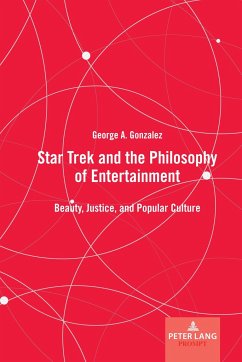Drawing on Hegel's model of aesthetics and beauty to analyze the Star Trek franchise, this book puts justice at the center of the "beauty"-and entertainment value-of popular culture. The author, George A. Gonzalez, shows that plot-revolving around justice and injustice-often determines the artistic success and popularity of TV and films. He argues that Star Trek is the most popular franchise in history because it puts the pursuit of justice, and therefore beauty, at the heart of its world.
Star Trek and the Philosophy of Entertainment also offers a major corrective to the prevailing academic treatment of popular culture, demonstrating that Star Trek and other shows consistently challenge class rule and other forms of oppression based on race, gender, and nationality. In the world of Star Trek, justice is represented by a modern, classless society, totally free of ethnic and gender biases.
Star Trek and the Philosophy of Entertainment also offers a major corrective to the prevailing academic treatment of popular culture, demonstrating that Star Trek and other shows consistently challenge class rule and other forms of oppression based on race, gender, and nationality. In the world of Star Trek, justice is represented by a modern, classless society, totally free of ethnic and gender biases.









